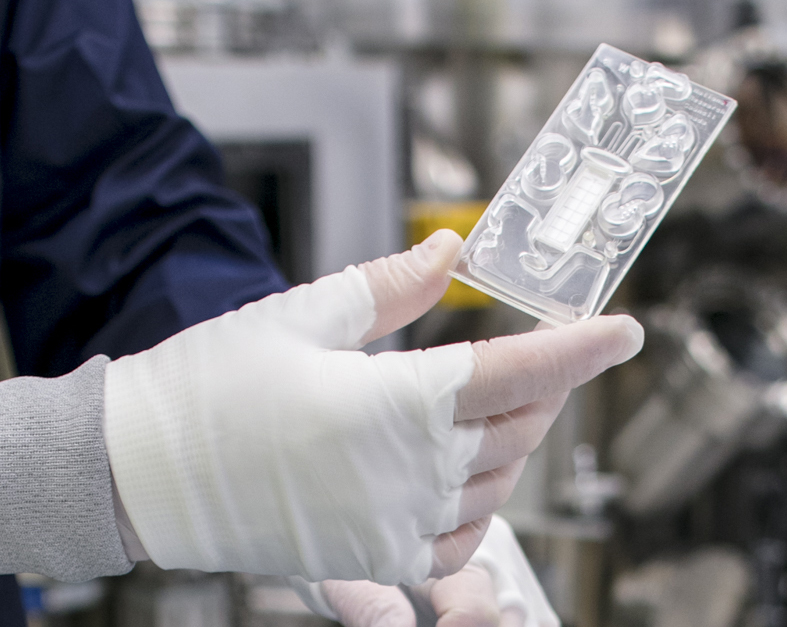MicroPREP: New advances in biological sample purification in space
MicroPREP is Canadian lab-on-a-chip technology that is based on centrifugal microfluidics with pneumatic control and uses smartphone-sized microfluidic chips. From a sample of body fluids, MicroPREP technology can isolate multiple macro-molecules such as DNA and proteins, or rare cells, making it possible to assess immune system state, inflammation, bone loss or radiation effects. The innovation could one day allow for various new science experiments to be conducted in space.
Background
Blood contains many substances, including cells, platelets, nutrients, hormones, and waste products. Purification must be done before analyzing a specific component, like DNA.
On Earth, highly trained personnel in specialized laboratories prepare the biological samples to be analyzed. Astronauts conducting science experiments in space do not have access to this kind of equipment, and their busy schedules do not permit them to spend large amounts of time preparing samples for scientific study or medical diagnosis.
MicroPREP's automated technology, compact size, and unique approach to purification could facilitate and accelerate the process of analyzing samples on Earth and in space. This new approach has the potential to empower personalized precision medicine in both clinical and remote settings by significantly reducing the sample preparation time and size, and human intervention required during medical testing.
The chip system also has great potential for being used in space, particularly to support medical diagnoses during human deep-space exploration missions.
MicroPREP: New advances in biological sample purification. (Credit: Canadian Space Agency [CSA], National Research Council Canada [NRC])
Objectives
MicroPREP aims to:
- develop microfluidic chips to isolate specific blood markers, particularly those related to the immune and cardiovascular systems, or to epigenetic changes caused by the space environment
- create simple chips that work in weightlessness
- automate the process of purifying and preparing a sample
- produce concentrated, standardized samples that could be used for analysis by standard technologies like the Bio-Analyzer
- stimulate the development and use in space of analysis instruments
Impacts on Earth
By means of a variety of microfluidic chips, MicroPREP technology automates and integrates complex biological tests. This technology makes it possible to isolate specific components of biological samples and automate the detection of pathogens. It will be used at Canada's first micro-analytics research centre, in partnership with the Centre hospitalier universitaire Sainte-Justine (Sainte-Justine University Hospital Centre), to target specific cancers and other pediatric diseases.
Its wide range of application even extends into other fields, such as the food safety sector, where it is essential to be able to isolate bacteria and viruses in order to prevent public health issues.
How it works
- The user selects the MicroPREP chip according to the type of test being performed.
- A sample of blood is added to MicroPREP's intake chamber.
- The chip is placed into a dedicated centrifuge designed to separate blood into its components. While being spun at high speed, the chip measures out a precise volume. MicroPREP uses between only 0.05 mL and 0.3 mL to perform the purification.
- MicroPREP isolates the targeted molecules, strips away sample impurities and extracts a concentrate that can be used for testing.
To find out more about how the centrifuge works, please watch this video from the NRC.

The automated lab-on-a-chip technology isolates components of liquid samples. (Credit: NRC)
MicroPREP has been tested during a parabolic flight way to assess the performance of new technology in weightlessness. During a parabolic flight, a modified jet flies in a pattern that creates 15-20 second periods of microgravity, allowing for the anticipation of problems that might occur in space.
Timeline
In partnership with the CSA, engineers and scientists at the NRC began designing MicroPREP in .
The CSA awarded a contract to MDA for the development of a dedicated centrifuge for use with MicroPREP technology in space. MDA teamed up with Vancouver-based medical technology company Starfish Medical to adapt the centrifuge to existing conditions on board the International Space Station (ISS).
In , MDA delivered the prototype centrifuge to the NRC. It will undergo testing before being sent to the ISS.
Researchers
-
Dr. Daniel Brassard and Dr. Teodor Veres, NRC
